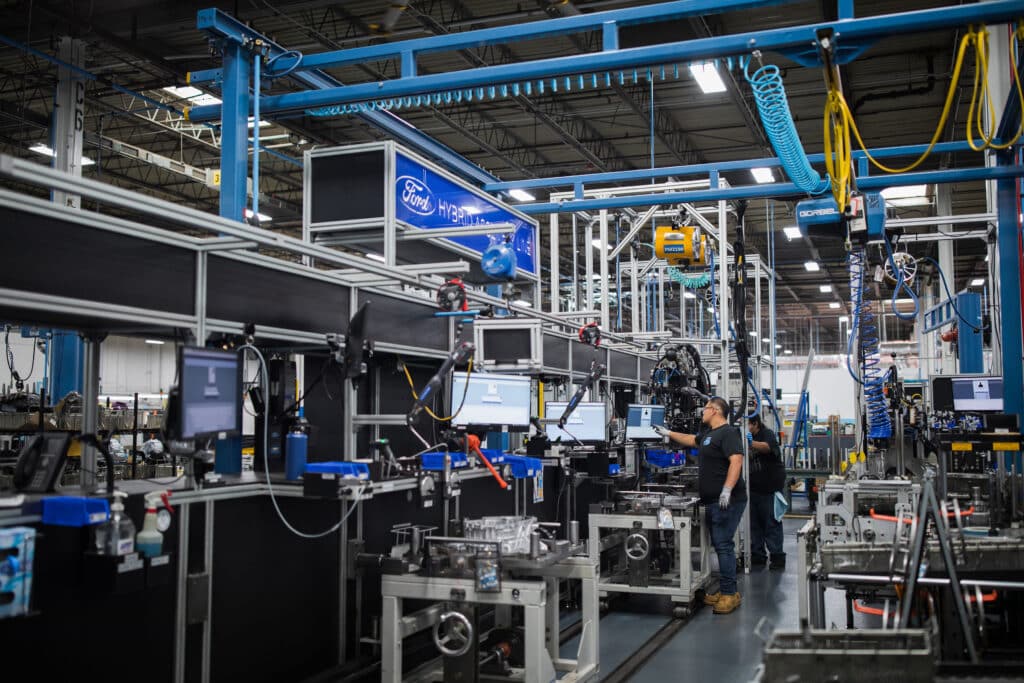
Article At A Glance
- Integrating CNC technology extends the lifecycle of automotive components, reduces costs, and minimizes waste, contributing to sustainability efforts.
- Advanced techniques, such as multi-axis machining, laser cutting, and additive manufacturing, enable greater complexity and detail in remanufactured parts.
- Precision is critical in remanufacturing, and CNC machines ensure exact specifications are met consistently, resulting in improved surface finishes and compatibility.
Transforming Automotive Remanufacturing with Advanced CNC Machining
Advanced CNC machining has redefined the remanufacturing of a wide range of automotive components, significantly improving precision, operational efficiency, and sustainability. As modern manufacturing evolves, manufacturers must adopt cutting-edge machining technology to meet the demands of today’s vehicles while optimizing machining operations and reducing operational costs.
Let’s explore how CNC machining transforms automotive remanufacturing and why it is pivotal in delivering high-quality components for contemporary applications.
The Role of CNC Machining in Automotive Remanufacturing
CNC (Computer Numerical Control) machining plays a vital role in the automotive remanufacturing process by delivering precision and efficiency.
Additional Read: Innovations in Machining for High-Performance Automotive Applications
Here’s how it contributes:
Key Benefits of CNC Machining
- Exceptional Precision: This process restores critical components like engine blocks, transmission systems, and electric motors to their original performance or better.
- Extended Component Lifecycle: Prolongs the life of essential parts, reducing waste and supporting sustainability.
- Eco-Friendly Practices: Utilizes sustainable materials and minimizes environmental impact.
- Reduced Machining Time: Speeds up the process while maintaining consistency in finished products.
- Meets Quality Standards: Ensures remanufactured parts meet or surpass stringent quality requirements.
Compatibility with Modern Materials
- Handles advanced composites, carbon fiber, and intricate shapes found in today’s vehicles.
- Ensures precision and compatibility with modern designs.
Why CNC is Essential
CNC machining is indispensable for manufacturers aiming to:
- Improve operational efficiency.
- Meet evolving customer demands for precision and sustainability.
- Stay compatible with the latest advancements in automotive materials and technology.
Advanced CNC Techniques for Modern Manufacturing
Modern manufacturing incorporates sophisticated CNC techniques beyond basic milling and turning, enabling manufacturers to meet the unique challenges of today’s automotive systems. These advanced methods include multi-axis, laser cutting, additive manufacturing, and dry machining.
- Multi-Axis Machining: This technique creates intricate shapes and complex geometries by moving tools across multiple axes. It is particularly useful for components like turbochargers and cylinder heads where precision is paramount.
- Laser Cutting: This high-tolerance method allows precise material removal, ensuring the structural integrity of parts during the remanufacturing process.
- Additive Manufacturing Integration: CNC machines now work alongside 3D printing technologies to repair or enhance damaged components efficiently, improving their performance by incorporating advanced composites.
- Dry Machining: Reducing the reliance on lubricants, dry machining supports eco-friendly materials and sustainability goals while maintaining optimal machining performance.
These innovative techniques streamline machining operations, reduce machining time, and promote sustainability in remanufacturing. They also empower manufacturers to deliver finished products that integrate seamlessly into modern automotive systems.
Enhancing Precision and Quality in Automotive Components
Precision and quality are non-negotiable in automotive remanufacturing, especially for critical components where even minor deviations can compromise safety and performance. CNC machining ensures exact specifications are consistently met, yielding high-quality components that rival new parts in reliability.
Additional Read: The Importance of Remanufacturing in the Automotive Industry: Enhancing Longevity, Sustainability, and Cost Efficiency
Key Benefits of CNC Precision:
- Improved Surface Finishes: Smooth surfaces reduce wear and enhance the durability of remanufactured parts.
- Enhanced Compatibility: CNC machining ensures that components fit seamlessly within modern vehicle systems, including electric motors and advanced composites.
- Superior Reliability: Parts produced with CNC machining exhibit consistent performance, reducing the need for frequent repairs or replacements.
Regular maintenance of CNC machines ensures their continued performance, allowing manufacturers to maintain their reputation for delivering superior quality in the manufacturing process.
The Sustainability Edge of CNC Machining
CNC machining supports sustainability by minimizing waste, utilizing eco-friendly materials, and extending the lifecycle of components. This approach aligns with the automotive industry’s shift toward more environmentally responsible practices.
Sustainable Practices Enabled by CNC Machining:
- Minimized Material Waste: Precise cutting and shaping reduce the generation of scrap materials.
- Reduced Energy Consumption: Optimized machining operations lower energy usage, contributing to sustainable production.
- Elimination of New Raw Materials: CNC machining reduces the demand for virgin resources by refurbishing used parts with advanced machining technology.
These advancements make the manufacturing process more efficient and lower remanufacturing’s carbon footprint, helping companies meet environmental standards and achieve their sustainability goals.
CNC Machining in Smart Factories
As the manufacturing industry adopts Smart Factory principles, CNC machining is increasingly integrated with AI and machine learning technologies to enhance efficiency. Predictive analytics and real-time monitoring help identify potential issues, ensuring consistent quality and minimizing downtime.
Additionally, the collaboration between skilled workers and advanced CNC systems ensures that even the most intricate shapes and designs are executed with unmatched precision. Combining human expertise and cutting-edge technology allows manufacturers to produce finished products that align with modern standards while optimizing operational costs.
The synergy between AI and human expertise creates a more flexible and adaptive manufacturing process, enabling manufacturers to stay ahead of the curve in an increasingly competitive industry.
Future Trends in CNC Machining for Automotive Remanufacturing
The future of CNC machining in automotive remanufacturing is incredibly bright, with emerging trends and cutting-edge technologies promising even greater levels of innovation and efficiency:
- AI and Predictive Analytics: Machine learning will enhance machining accuracy and reduce downtime by predicting maintenance needs.
- Sustainable Materials Integration: The use of eco-friendly materials and advanced composites will further reduce environmental impact.
- Collaboration with Additive Manufacturing: Combining CNC with 3D printing will unlock new possibilities for lightweight, high-performance components.
Dynamic Manufacturing is at the forefront of these advancements, leveraging state-of-the-art equipment to meet the ever-changing demands of modern manufacturing.
Partner with Dynamic Manufacturing for CNC Excellence
CNC machining is revolutionizing the automotive remanufacturing industry, offering unparalleled precision, sustainability, and efficiency. Dynamic Manufacturing delivers high-quality components with cutting-edge CNC techniques, ensuring that every part meets the strictest quality standards for precision, durability, and performance.
Additional Read: How Dynamic Manufacturing Is Pioneering Sustainability in Automotive Remanufacturing
Whether you need to restore critical components, reduce operational costs, or enhance the manufacturing process, Dynamic Manufacturing has the expertise to help. Call (708) 343-8753 today to learn how our advanced CNC machining capabilities can support your automotive remanufacturing needs.



